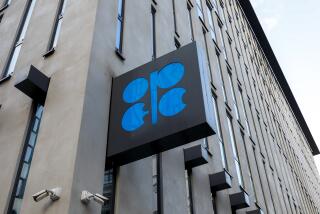Some in OPEC Want to Hike Output, Yamani Says
- Share via
MANAMA, Bahrain — Former Saudi oil minister Ahmed Zaki Yamani said Tuesday that some members of OPEC want to boost their output, a move that would disrupt the group’s November production accord that has helped push up world prices.
“It is very clear there are countries in the Organization of Petroleum Exporting Countries who are looking for higher quotas,” Yamani told an energy law seminar in Bahrain.
“Iraq for instance . . . accepted a quota of 2.6 million barrels per day because its export capacity is less than 3 million barrels per day,” Yamani said. “But when they have an export capacity of over 5 million barrels per day by the end of this year . . . you have to pause a little and think whether they are going to continue to accept producing 2.5 million barrels per day.”
Iraq, which rejoined the OPEC quota system last November after a two-year absence, is due this September to open a new pipeline to the Red Sea terminal of Yanbu, boosting its capacity by 1.1 million barrels daily.
The OPEC states agreed in November to cut oil output by about 4 million barrels to 18.5 million barrels per day to boost world oil prices to a target of $18 a barrel. Prices have since risen about $5 a barrel.
Yamani said Iran--which plans to boost its export capacity to around 4 million from 3 million barrels daily--is in a similar position as Iraq regarding higher quotas, as are other producers which badly need oil revenue.
The former minister’s comments pushed U.S. energy futures prices lower by hinting at possible increases in world oil supplies. April contracts for West Texas Intermediate, the U.S. benchmark crude grade, fell 37 cents to $18.30 a barrel in New York.
Yamani, who was replaced by Hisham Nazer as oil minister in October, 1986, predicts that oil prices will remain “soft without collapsing” until 1992, when Persian Gulf producers will control most of the crude exported to the West.
The trend in prices will then depend on whether OPEC learns from its mistakes of 1979, when member states allowed oil prices to double to nearly $40 a barrel in the year after the Iranian revolution, Yamani said.
More to Read
Sign up for Essential California
The most important California stories and recommendations in your inbox every morning.
You may occasionally receive promotional content from the Los Angeles Times.













